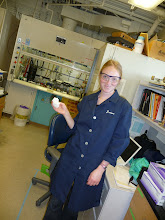Did you ever wonder why getting a fever can be so dangerous? Or why food spoils faster when you leave it out of the fridge?
Let's consider the effect of temperature on the rate of a reaction with the use of the Arrhenius equation.
Let's consider the effect of temperature on the rate of a reaction with the use of the Arrhenius equation.
where k is the reaction rate constant, A is a "pre-exponential factor," which depends on the order of the reaction, R is the universal gas constant, and T is temperature. It is clear that if the temperature increases, the rate constant will increase as well. When considering common reactions that occur at room temperature, people often say that the rate of the reaction roughly doubles for every 10 degree increase in temperature. Although this is a useful generalization to keep in mind, it is only true when the energy of activation is low (on the order of 10 kcal/mol). Otherwise, this statement does not hold.
For a reaction with Ea=10 kcal/mol and A=1, the following values of k are obtained: It is apparent that the rule holds in this case. What about when the activation energy is slightly greater, say 20 kcal/mol?
It is apparent that the rule holds in this case. What about when the activation energy is slightly greater, say 20 kcal/mol?
 In this case, the rate constants change more significantly with a change in temperature. (Does anyone know why this might be?)
In this case, the rate constants change more significantly with a change in temperature. (Does anyone know why this might be?)
For many reactions that occur near biological temperature, however, the rate does in fact roughly double with a 10 degree increase in temperature. This large effect of temperature on reaction rate can cause a serious disturbance in the fine-tuned ensemble of reactions occurring in our bodies.
Then why, you might ask, do we get fevers when we are sick? The existence of several pathogens that cause human illness is highly dependent on temperature. By raising our internal body temperature above the range in which a pathogen can survive, we are sometimes able to kill the organisms that have infected our bodies, albeit with some undesirable side effects.
 It is apparent that the rule holds in this case. What about when the activation energy is slightly greater, say 20 kcal/mol?
It is apparent that the rule holds in this case. What about when the activation energy is slightly greater, say 20 kcal/mol? In this case, the rate constants change more significantly with a change in temperature. (Does anyone know why this might be?)
In this case, the rate constants change more significantly with a change in temperature. (Does anyone know why this might be?)For many reactions that occur near biological temperature, however, the rate does in fact roughly double with a 10 degree increase in temperature. This large effect of temperature on reaction rate can cause a serious disturbance in the fine-tuned ensemble of reactions occurring in our bodies.
Then why, you might ask, do we get fevers when we are sick? The existence of several pathogens that cause human illness is highly dependent on temperature. By raising our internal body temperature above the range in which a pathogen can survive, we are sometimes able to kill the organisms that have infected our bodies, albeit with some undesirable side effects.





1 comment:
Interesting equation....There is generally an increase of 10 beats per minute in the HR for every degree (Farenheit)rise in temperature.
Post a Comment